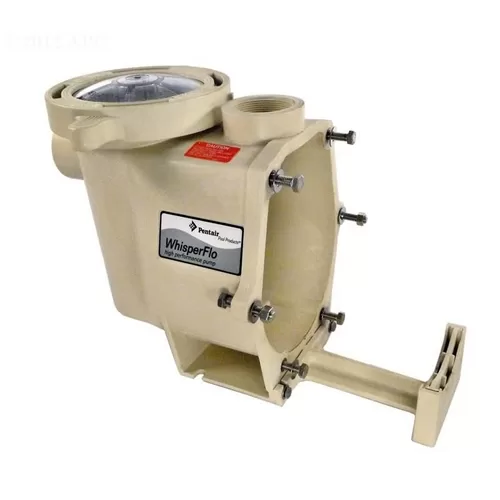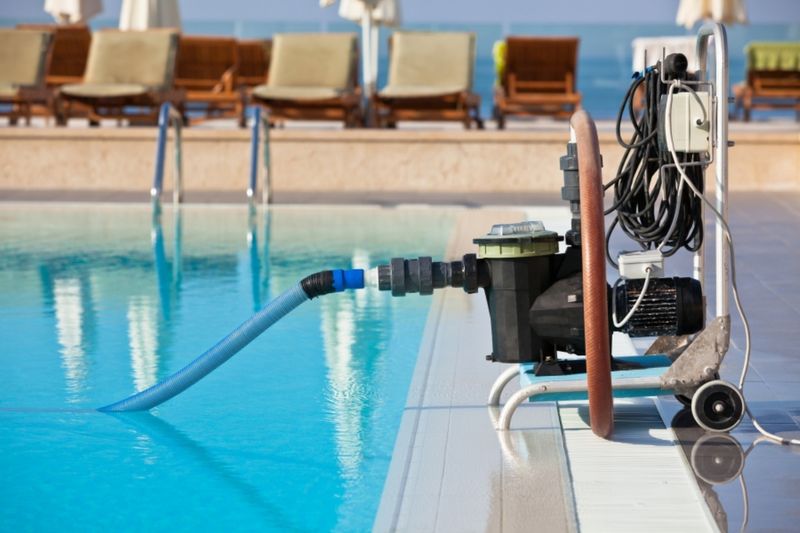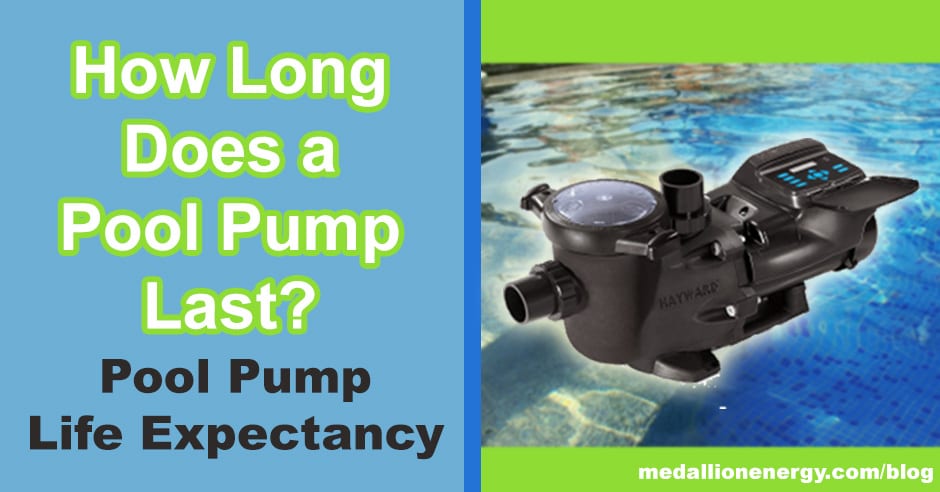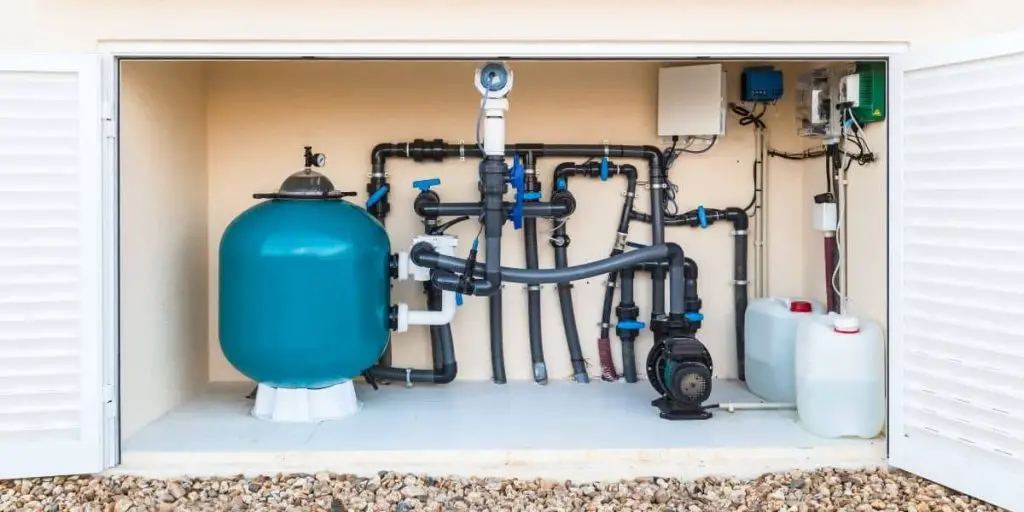Pool pumps typically last around 8-15 years, depending on usage and maintenance. A well-functioning pool pump is essential for keeping your pool clean and properly circulated.
Over time, however, these pumps can wear out and may need to be replaced. So, how long do pool pumps actually last? On average, pool pumps can last anywhere from 8 to 15 years. However, this lifespan can vary depending on several factors, including how often the pump is used, the quality of the pump, and how well it is maintained.
We will take a closer look at the lifespan of pool pumps and provide some tips for extending their longevity. So, if you’re wondering how long your pool pump will last, keep reading to find out.

Credit: blog.intheswim.com
The Lifespan Of Pool Pumps
When it comes to maintaining a sparkling and inviting pool, one of the most crucial components is the pool pump. The lifespan of pool pumps is a key consideration for pool owners as it influences maintenance costs and the reliable functioning of the pool filtration system. In this article, we will delve into the factors affecting the longevity of pool pumps and the common lifespan expectations.
Factors Affecting Longevity
- Usage: Regular routine maintenance increases the lifespan of the pump.
- Quality: High-quality materials and construction contribute to a longer lifespan.
- Environment: The climate and exposure to elements can impact the longevity of the pump.
- Proper Sizing: Oversized or undersized pumps may experience premature wear and tear.
Common Lifespan Expectations
Pool pumps typically last between 8 to 12 years. However, with meticulous maintenance and care, some pumps can exceed this timeframe. Conversely, neglect and improper care can significantly reduce the lifespan, necessitating premature replacement.
Signs Of Wear And Tear
Decreased Performance
Pool pumps experiencing diminished performance may indicate wear and tear.
Unusual Noises
If your pool pump starts making strange noises, it could be a sign of wear and tear.
Maintenance Practices
Maintaining your pool pump is essential to ensure its longevity and efficient performance. By following a few simple maintenance practices, you can extend the lifespan of your pool pump and keep your pool in pristine condition. In this section, we will discuss the importance of regular cleaning and proper lubrication for your pool pump.
Regular Cleaning
Cleaning your pool pump regularly is crucial to prevent clogs and debris buildup, which can compromise its functionality. Here are a few cleaning tips to keep your pool pump running smoothly:
- Remove any leaves, twigs, or large debris from the pump basket and skimmer basket.
- Inspect and clean the impeller, removing any obstructions that may affect water flow.
- Routinely check the pump strainer lid and o-ring for any signs of wear or damage.
- Backwash and clean your pool filter to remove accumulated dirt and debris.
Proper Lubrication
Ensuring proper lubrication of your pool pump is essential for its efficient operation and to prevent damage. Here are a few key points to remember when lubricating your pool pump:
- Regularly inspect the pump motor bearings and lubricate them according to the manufacturer’s instructions.
- Use a high-quality lubricant on the pump lid o-ring, ensuring a tight seal and preventing air leaks.
- Check the motor shaft for any signs of rust or corrosion and apply a rust inhibitor, if necessary.
- Apply lubricant on the valve stem o-rings, ensuring smooth operation and a watertight seal.
By following these maintenance practices, you can significantly prolong the life of your pool pump and enjoy a clean and well-maintained pool. Remember to consult the manufacturer’s guidelines for specific maintenance instructions tailored to your pool pump model.

Credit: www.alwaysclearpoolcleaning.com
Repair Vs. Replacement
Pool pumps typically last around 8-12 years with proper maintenance. Considering costs, repairing the pump can be a cost-effective option compared to replacing it entirely. Regular servicing can prolong the lifespan of pool pumps, ensuring efficient functionality for years to come.
When it comes to pool pump maintenance, one common dilemma that pool owners face is whether to repair or replace their pool pumps. While some minor issues can be fixed with a simple repair, there may come a time when replacement becomes the more cost-effective and environmentally friendly option.
Cost Considerations
The cost of repairing a pool pump can vary depending on the extent of the damage and the availability of replacement parts. In some cases, a minor repair may be all that is needed to get the pump up and running efficiently again. However, if the repairs are extensive or if the pump is old and nearing the end of its lifespan, it may be more cost-effective to invest in a new pump.
Before making a decision, it’s important to consider the long-term costs of repairing versus replacing. In some cases, a new pump may be more energy-efficient, resulting in lower utility bills over time. Additionally, newer models often come with warranties, providing added peace of mind and potential savings on future repairs.
Table: Cost Comparison of Repair vs. Replacement
| Repair | Replacement |
|---|---|
|
|
Environmental Impact
Another important factor to consider when deciding between repair and replacement is the environmental impact. Older pool pumps may not be as energy-efficient as newer models, leading to increased energy consumption and higher carbon emissions. By replacing an older pump with a more energy-efficient one, you can not only reduce your utility bills but also minimize your carbon footprint.
Additionally, if a pump is beyond repair and ends up in a landfill, it contributes to environmental waste. Opting for replacement instead of repairing can help reduce waste and promote a more sustainable approach to pool maintenance.
Upgrading Pool Pumps
When it comes to upgrading pool pumps, it’s important to consider energy-efficient options and advanced features. Upgrading your pool pump can not only improve the overall efficiency of your pool system but also save you money on energy costs in the long run.
Energy-efficient Options
One of the best ways to upgrade your pool pump is to choose an energy-efficient option. These pumps are designed to use less electricity while still maintaining the same level of performance. They are more environmentally friendly and can significantly reduce your pool’s carbon footprint. Energy-efficient pumps use advanced motor technology and variable speed settings to optimize water flow and minimize energy consumption. With their lower energy usage, these pumps not only save you money but also extend the lifespan of your pool pump.
Advanced Features
When upgrading your pool pump, it’s worth considering pumps with advanced features. These pumps offer enhanced functionality and improved performance. Some advanced features to look for include:
- Remote control functionality: Control your pool pump from anywhere using a smartphone or tablet.
- Automatic scheduling: Set custom schedules for your pump to save energy and keep your pool clean.
- Self-diagnostic capabilities: Monitor your pump’s performance and receive alerts for maintenance or repairs.
By investing in a pool pump with advanced features, you can enjoy greater convenience and control over your pool’s maintenance. These features not only simplify the operation of your pool pump but also make it easier to optimize its performance for maximum efficiency.
Professional Insights
When it comes to the longevity of pool pumps, it’s essential to consider the insights and recommendations from industry professionals. Understanding the best practices and guidelines from experts can help you make informed decisions about the maintenance and replacement of your pool pump.
Best Practices From Experts
Pool pump longevity can be influenced by various factors, but following best practices can help extend the lifespan of your equipment:
- Regular Maintenance: Schedule routine maintenance to ensure proper functioning and early detection of potential issues.
- Proper Sizing: Consult with a professional to ensure your pump is appropriately sized for your specific pool requirements.
- Quality Installation: Proper installation by experienced professionals can optimize the performance and durability of your pump.
Industry Recommendations
Industry norms and guidelines also offer valuable insights for maintaining the longevity of pool pumps:
- Manufacturer’s Warranty: Adhere to the manufacturer’s recommended maintenance schedule and guidelines to uphold the warranty and maximize the pump’s lifespan.
- Consider Energy Efficiency: Upgrading to an energy-efficient pump can not only prolong its lifespan but also reduce operating costs over time.
- Regular Inspections: Periodically inspecting the pump and its components for wear and tear can help identify potential issues early on.
Prolonging Pump Lifespan
When it comes to maintaining a pool, the lifespan of the pump is a crucial consideration. A well-maintained pool pump can last anywhere from 8 to 15 years, but several factors can affect its durability. By following certain practices aimed at prolonging the pump lifespan, you can ensure that your pool pump operates efficiently for years to come.
Effective Tips For Longevity
Regular Maintenance: Perform routine checks on the pump, ensuring that all parts are functioning properly and are free from debris. Clean Filters: A clean filter alleviates the strain on the pump and promotes longevity. Proper Installation: Ensure the pump is correctly installed, with the right voltage and adequate protection from the elements. Balanced Water Chemistry: Maintain the pool’s chemical balance to prevent corrosion and damage to the pump.
Extending The Durability
Invest in a Pool Cover: Using a pool cover reduces the pump’s workload by minimizing debris and evaporation. Invest in a Variable Speed Pump: These pumps are more energy efficient and can extend the lifespan of the pump. Replace Seals and O-rings: Ensure that the seals and O-rings are maintained and replaced as needed to prevent leaks and excess wear on the pump. Regular Inspections: Schedule routine inspections from a professional to identify and address any potential issues before they escalate.

Credit: www.medallionenergy.com
Future Of Pool Pump Technology
Pool pump technology constantly evolves, enhancing efficiency and durability.
- Advanced features like variable speed settings
- Improved energy-saving capabilities
- Enhanced durability for long-term use
Innovative designs are revolutionizing the pool pump industry, providing better performance.
- Compact and space-saving pump models
- Quiet operation for a peaceful pool environment
- Smart technology integration for remote monitoring
Conclusion
When considering pool pump lifespan, regular maintenance is crucial. Monitoring usage and performance can extend pump longevity. Professional inspections and timely repairs are key. By understanding factors that influence pump durability, such as quality and usage, you can maximize your pool pump’s lifespan.
Regular care is essential.




